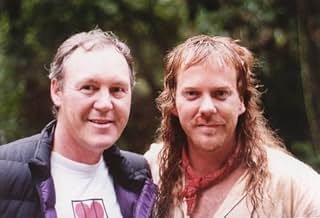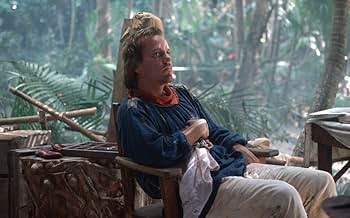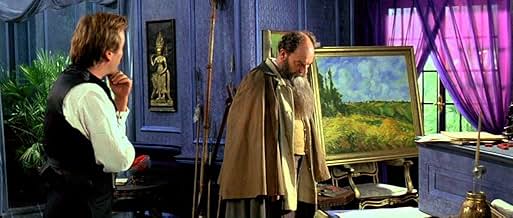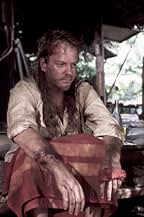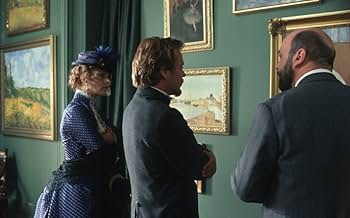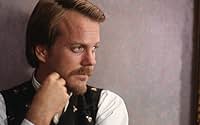Ajouter une intrigue dans votre langueA successful 19th century French stockbroker (Sutherland) leaves his profession to become an artist in Paris.A successful 19th century French stockbroker (Sutherland) leaves his profession to become an artist in Paris.A successful 19th century French stockbroker (Sutherland) leaves his profession to become an artist in Paris.
- Réalisation
- Scénario
- Casting principal
Jana Bittnerová
- Suzanne
- (as Jana Bittnerova)
Avis à la une
Can anyone tell me of another film on Gauguin's life? While not as passionate as Lust for Life (van Gogh), I enjoyed seeing Paradise Found, and I saved it & have watched it several times now. I wanted it to go on longer.
In my 30s I painted several oils, & seeing this has inspired me to get out my brushes again. I wish more artists lives were available. William Blake, Turner, and others. PF was made by Australians, & I bet Hollywood would have changed the story line even more.
In my 30s I painted several oils, & seeing this has inspired me to get out my brushes again. I wish more artists lives were available. William Blake, Turner, and others. PF was made by Australians, & I bet Hollywood would have changed the story line even more.
An absolutely dreadful rendition of Gauguin's life on Tahiti.There is no sense of his passion in a wonderful adventure in the South Seas and the real difficulties he faced.Having studied this painters life in some detail I find this biopiic unbelievably innacurate. We even have his wife Mette loving his paintings from Tahiti, which in reality she despised. There is even a scene of her at his exhibition in Paris, an event she refused to attend.She never appreciated any of his work. If a filmmaker or writer embarks on a biopic picture they need to keep the basic facts correct. The Directing and editing is very slow and not very entertaining. It is difficult to blame the actors with such a pedestrian script but I found the casting quite misguided. Gauguin must be quaking in his grave at this effort at portraying his brave and noble life in pursuit of his art.
5=G=
"Paradise Found" attempts to tell the story of Paul Gauguin (Sutherland) and flops. The film neither works as a biopic or a drama treating the subject only superficially, leaving gaping holes where important events belong, showing generally lackluster direction, and apparently fraught with low budgetness. Those interested in the life of Gauguin can learn more in a few minutes on the internet and those interested in a drama can easily dredge up something better on broadcast. Nonetheless, "Paradise Found" may have some value for Sutherland or Kinski fans or others who happen to surf it on broadcast as did I. (C)
This film, as far as I can remember, never had a commercial run here, or at least, this movie probably went to cable right after it's release in other countries. The idea of watching a biopic about Gauguin intrigued me since this painter had a turbulent career and his paintings, especially his Tahitian ones, revolutionized the art world.
As it has been pointed out by other contributors to this forum, Paul Gauguin had a difficult life. He was never clearly understood by his wife, or the general public he tried to conquer. He was a passionate man who left all the comforts in order to pursue an ambition that never gave him the happiness or economic security that others attained.
The screen play, not being linear, doesn't add much to the story. We are constantly taken back and forth, knowing little about the man. Paul Gauguin's family life was an unhappy one. His wife Mette never clearly understood him, nor stuck by him when he abandoned the brokerage house. Mette appears as a cold woman who never shared her husband's passion for the life he embarked.
Kiefer Sutherland's interpretation of the painter can go so far; he is hindered by an uninspired screen play. As far as his struggle with the local priest, who clearly wants to take the natives' culture away from them, is only a distraction. Actually, we see very little about the passion that consumed Gauguin during his time in Tahiti as he spends very little time doing what he went there for, in the first place: painting!
As it has been pointed out by other contributors to this forum, Paul Gauguin had a difficult life. He was never clearly understood by his wife, or the general public he tried to conquer. He was a passionate man who left all the comforts in order to pursue an ambition that never gave him the happiness or economic security that others attained.
The screen play, not being linear, doesn't add much to the story. We are constantly taken back and forth, knowing little about the man. Paul Gauguin's family life was an unhappy one. His wife Mette never clearly understood him, nor stuck by him when he abandoned the brokerage house. Mette appears as a cold woman who never shared her husband's passion for the life he embarked.
Kiefer Sutherland's interpretation of the painter can go so far; he is hindered by an uninspired screen play. As far as his struggle with the local priest, who clearly wants to take the natives' culture away from them, is only a distraction. Actually, we see very little about the passion that consumed Gauguin during his time in Tahiti as he spends very little time doing what he went there for, in the first place: painting!
The Post-Impressionist painter Paul Gauguin was famously portrayed by Anthony Quinn in the Van Gogh biopic "Lust for Life" in the fifties, a performance which won Quinn a "Best Supporting Actor" Oscar, even though his character is only on stage for eight minutes. In "Paradise Found" it is Gauguin's turn to take centre stage. This is not a complete biography of the painter- Van Gogh, for example, is never mentioned- but concentrates on two periods in his life.
In 1880 Gaugin is working as a stockbroker in Paris. His job pays well and he has become a fully paid-up member of the French haute bourgeoisie. He is also an amateur painter and an enthusiastic art collector. A chance meeting with the older artist Camille Pissarro, who later becomes a close friend, persuades him that his vocation is to paint full-time and he resigns from his job, much to the dismay of his Danish-born wife Mette.
Intercut with the scenes showing the beginning of Gauguin's artistic career are others set during a later part of his life. He is now separated from Mette and his family and living in Tahiti where he has gone to seek inspiration. He befriends the local inhabitants, whose way of life he admires, and clashes with the local missionaries and the French colonial authorities who he believes are threatening to destroy traditional Tahitian culture in their zeal to bring Christianity to the island. The film's title, an obvious play on that of Milton's "Paradise Lost", therefore has an ironic meaning. Gauguin believes that he has found Paradise in Tahiti, but it is a Paradise in danger of being "lost" again, and that danger, ironically, comes from the Christian religion of which Milton was so ardent an advocate.
Gauguin is played by Kiefer Sutherland whose father, Donald, also once played the artist, in the 1986 film "The Wolf at the Door", which I must admit I have never seen. Now there is nothing really wrong with Kiefer's performance here, but it does not really catch fire. The best of the cast is probably Alun Armstrong as Pissarro. Nastassja Kinski never really looks convincing as Mette, largely because of that blonde wig. (Someone obviously told the director, incorrectly, that there are no brunettes in Denmark).
It is not impossible to make a bad film about the life of a great artist- Derek Jarman managed it with the near-incomprehensible "Caravaggio"- but because so many famous have been passionate, larger-than-life individuals, films about them give great scope for film-makers and actors to produce something memorable. I am thinking not only of Quinn and Kirk Douglas in "Lust for Life" but also of Charles Laughton in "Rembrandt", Charlton Heston as Michelangelo in "The Agony and the Ecstasy", Colin Firth as Vermeer in "The Girl with a Pearl Earring" and Timothy Spall in Mike Leigh's recent "Mr Turner". "Paradise Found" is visually attractive, both in those scenes set in France and those taking place in the South Pacific, and overall it is not a bad film. In fact, it is quite a good one. I just felt that a film dealing with someone like Gauguin could have done better than "quite good". 7/10
In 1880 Gaugin is working as a stockbroker in Paris. His job pays well and he has become a fully paid-up member of the French haute bourgeoisie. He is also an amateur painter and an enthusiastic art collector. A chance meeting with the older artist Camille Pissarro, who later becomes a close friend, persuades him that his vocation is to paint full-time and he resigns from his job, much to the dismay of his Danish-born wife Mette.
Intercut with the scenes showing the beginning of Gauguin's artistic career are others set during a later part of his life. He is now separated from Mette and his family and living in Tahiti where he has gone to seek inspiration. He befriends the local inhabitants, whose way of life he admires, and clashes with the local missionaries and the French colonial authorities who he believes are threatening to destroy traditional Tahitian culture in their zeal to bring Christianity to the island. The film's title, an obvious play on that of Milton's "Paradise Lost", therefore has an ironic meaning. Gauguin believes that he has found Paradise in Tahiti, but it is a Paradise in danger of being "lost" again, and that danger, ironically, comes from the Christian religion of which Milton was so ardent an advocate.
Gauguin is played by Kiefer Sutherland whose father, Donald, also once played the artist, in the 1986 film "The Wolf at the Door", which I must admit I have never seen. Now there is nothing really wrong with Kiefer's performance here, but it does not really catch fire. The best of the cast is probably Alun Armstrong as Pissarro. Nastassja Kinski never really looks convincing as Mette, largely because of that blonde wig. (Someone obviously told the director, incorrectly, that there are no brunettes in Denmark).
It is not impossible to make a bad film about the life of a great artist- Derek Jarman managed it with the near-incomprehensible "Caravaggio"- but because so many famous have been passionate, larger-than-life individuals, films about them give great scope for film-makers and actors to produce something memorable. I am thinking not only of Quinn and Kirk Douglas in "Lust for Life" but also of Charles Laughton in "Rembrandt", Charlton Heston as Michelangelo in "The Agony and the Ecstasy", Colin Firth as Vermeer in "The Girl with a Pearl Earring" and Timothy Spall in Mike Leigh's recent "Mr Turner". "Paradise Found" is visually attractive, both in those scenes set in France and those taking place in the South Pacific, and overall it is not a bad film. In fact, it is quite a good one. I just felt that a film dealing with someone like Gauguin could have done better than "quite good". 7/10
Le saviez-vous
- AnecdotesKiefer Sutherland's father, Donald Sutherland, also portrayed the artist Paul Gauguin in the film Gauguin, le loup dans le soleil (1986).
- GaffesPissarro is misspelled "Pissaro" in the closing credits (but spelled correctly in the DVD captions).
- Citations
Paul Gauguin: I have some advice of my own: you'd best mind your own fucking business.
- ConnexionsVersion of Gauguin Le Sauvage (1980)
Meilleurs choix
Connectez-vous pour évaluer et suivre la liste de favoris afin de recevoir des recommandations personnalisées
- How long is Paradise Found?Alimenté par Alexa
Détails
- Date de sortie
- Pays d’origine
- Langue
- Aussi connu sous le nom de
- Gauguin: Diario de un genio
- Lieux de tournage
- Sociétés de production
- Voir plus de crédits d'entreprise sur IMDbPro
Box-office
- Budget
- 10 000 000 $AU (estimé)
- Durée
- 1h 33min(93 min)
- Couleur
- Mixage
- Rapport de forme
- 2.35 : 1
Contribuer à cette page
Suggérer une modification ou ajouter du contenu manquant


